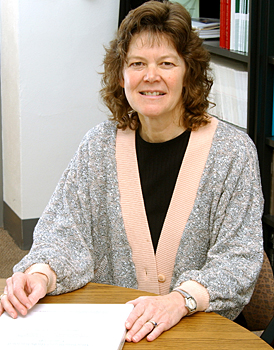Given by the New York Attachment Consortium, a part of the Center for Mental Health Promotion, the award is one of the most prestigious in the field and honors John Bowlby and Mary Ainsworth, who were leaders in research on attachment in children.
Dozier was cited for conducting “translational research on adoption applying attachment theory on behalf of adults offering care and infants and children seeking security.” Translational research applies scientific research on children at risk through prevention and intervention.
“I am delighted to receive the award,” Dozier said. “Those who have previously received the award are outstanding in attachment research, and I am in great company.”
Dozier is the principal investigator in UD's Infant Caregiver Project. Originally, the project focused on the Delaware foster care program, studying young children who have experienced early adversity and challenges in foster and adoptive care and developing and testing the effectiveness of intervention and training programs for caregivers.
More recently, the Infant Caregiver Project received a $3.3 million grant from the National Institute of Mental Health for a five-year research project, working with the Children and Youth Division of the Philadelphia Department of Human Services and focusing on services and skills for high-risk families in the city.
The project applies what has been learned in terms of intervention and prevention with children who were at risk in Delaware to work with the families in Philadelphia. “We are researching the outcomes of intervention for foster children and children who are at risk for neglect, but who remain in the care of their birth parents,” Dozier said.
Typically, members of the research team of graduate students and staff make three visits to the family to assess the child/parent relationship. The parents then receive a series of 10 home-training sessions, which are videotaped to help the parents gain insights into their interactions with their children. Following the training sessions, the research team measures the outcomes of the intervention.
“We focus on three factors when working with families,” Dozier said. “The first is that children in foster care often push caregivers away, but, like all children, they need nurturing care. We help caregivers see that children need them even though they may not appear to need them.
“The second is that nurturance may not 'come naturally' to some caregivers. We try to help them override their natural propensities and provide nurturing care even though it does not come naturally.
“The third, is helping caregivers provide a responsive interpersonal world so that children can develop their abilities to regulate biology and behavior more similarly to other children.”
To determine how children regulate their biology, team members test the children's cortisol levels using a simple saliva test. Cortisol is a steroid hormone that follows a daily pattern.
“We assess cortisol production before and after the training sessions,” Dozier said. “Our research with foster children indicates that the cortisol level pattern of children whose parents have participated in the training sessions looks more similar to the pattern of children who have never been in foster care, and dissimilar to foster children whose parents received other training.
“It is exciting to carry out this research to learn how intervention programs can affect both biology and behavior of young vulnerable children,” Dozier said.
Dozier received her bachelor's and doctoral degrees from Duke University and joined the UD faculty in 1993 from Trinity University. She has published, lectured and served on the editorial boards of journals in her field and was the Grace Brody Visiting Scholar at Case Western Reserve University in 2005 and received the National Institute of Mental Health Innovation Award in 2006. She receives funding from the National Institute of Mental Health and from Edna Bennett Pierce.
Article by Sue Moncure
Photo by Kathy Atkinson



